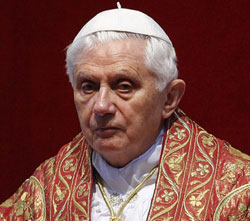The surprise resignation of Pope Benedict XVI. has left open several questions. In view of the church scandals in recent years from hundreds of abuse cases to the Vatileaks-affair, where personal documents of the Pope were published, there are many conspiracy theories.
Many just wonder why the Pope has chosen February 28 8:00 PM (CET) for this historic resignation. Vatican spokesman Federico Lombardi responded to the question on Tuesday at a press conference. That has nothing to do with legal or other reasons, Lombardi explained to reporters in Rome. Rather, “at this time usually the working of the Holy Father ends.”
Previously, on February 27, Benedict XVI wants to say goodbye to the faithful in the Saint Peter’s Square . During that day “the last general audience will take place,” Lombardi said. The audience will take place at St. Peter’s, “because a lot of people are expected.”
There are many even within the Roman Catolic Church that challenged the statement, that Benedict XVI. is resigning because of his age and health status. They rather imagine a “coup by the conservatives”, or other reasons such as the “documents and banking scandals”. “Now, once all look forward to what’s really behind it, possibly beyond age and health. Was it a coup by the conservatives, or he has come under pressure for other reasons? For the ultra-conservative Society of St. Pius X the Pope behaves and decides way too open and liberal. “And the Vatican is interspersed with these people”.

